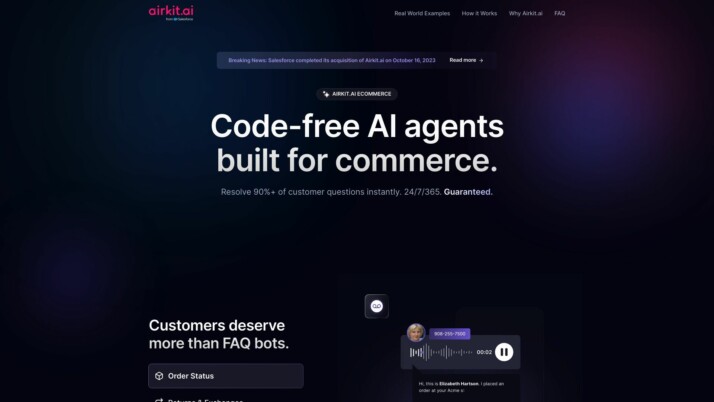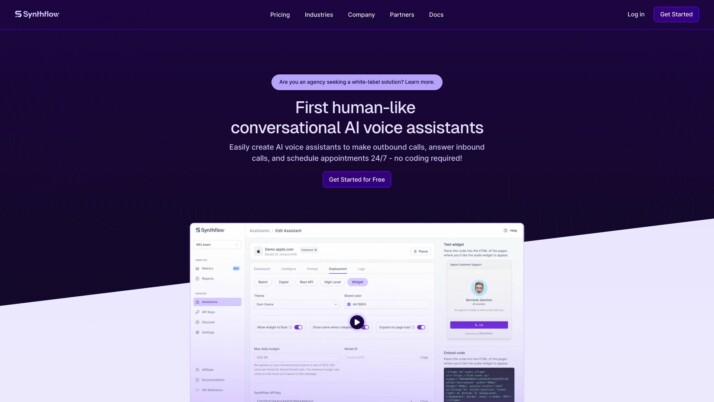Airkit AI vs. Synthflow: Comparing AI-Powered Customer Service Solutions
AI-powered customer service solutions are transforming how businesses interact with their customers. Airkit AI vs. Synthflow offer unique approaches to this challenge, each with distinct strengths and limitations. This comparison explores how these platforms stack up against SmythOS, a versatile AI development and deployment solution.
We’ll dive into key features, use cases, and integration capabilities to help you determine which platform best suits your business needs. Whether you’re a developer seeking robust API options, a business leader focused on scalability and security, or a non-technical user looking for accessible AI tools, this analysis provides valuable insights to guide your decision-making process.
Airkit AI Overview
Airkit AI transforms customer service with intelligent, no-code AI agents. Acquired by Salesforce in 2023, Airkit AI integrates seamlessly into existing CRM systems to automate omnichannel support for ecommerce businesses. The platform deploys AI agents capable of resolving 90%+ of repetitive customer inquiries across web chat, mobile, voice, and email channels.


Airkit AI transforms customer service with intelligent, no-code AI agents … capable of resolving 90%+ of repetitive customer inquiries across web chat, mobile, voice, and email channels.
Airkit AI’s core strength lies in its rapid deployment of industry-specific AI agents. Users can launch customized support automation within hours, without writing code. The platform comes equipped with pre-built conversational skills tailored for ecommerce, allowing businesses to quickly address common queries about orders, returns, and product information.
Scalability sets Airkit AI apart in the competitive landscape. The cloud-based infrastructure automatically scales to meet demand spikes, ensuring consistent performance during high-volume periods. This elasticity, combined with continuous learning capabilities, allows AI agents to improve resolutions over time and handle increasingly complex customer issues.
While Airkit AI excels in ecommerce support automation, it may have limitations for businesses outside this sector. The platform’s tight integration with Salesforce, while beneficial for many, could potentially restrict flexibility for organizations using alternative CRM solutions. Additionally, the lack of a visual builder might pose challenges for users seeking more granular control over agent design.
Airkit AI’s focus on compliance and built-in safeguards addresses critical concerns around AI deployment in customer-facing roles. The platform ensures AI agents adhere to business policies and industry standards, providing transparency and control essential for maintaining brand integrity and customer trust.
Synthflow Overview
Synthflow empowers businesses to create customizable AI voice assistants without coding expertise. The platform’s no-code interface and pre-built templates make advanced AI technology accessible to users with varying technical backgrounds.
Synthflow’s AI assistants excel in customer support, lead generation, and appointment scheduling. The platform prioritizes data security, offering unlimited secure storage in a dedicated Pinecone environment. Seamless integrations with tools like 11Labs and Twilio expand functionality, allowing businesses to enhance their AI capabilities.


Synthflow empowers businesses to create customizable AI voice assistants without coding expertise. The platform’s no-code interface and pre-built templates make advanced AI technology accessible to users with varying technical backgrounds.
The intuitive interface enables users to design and manage AI agents effortlessly. Synthflow supports both batch deployments for large-scale communication campaigns and real-time interactions through website widgets. This flexibility allows businesses to tailor their AI solutions to specific needs and scale operations efficiently.
Synthflow stands out with its comprehensive documentation and support, helping users maximize the platform’s potential. However, the lack of a visual builder and some advanced features like debug mode or multi-agent collaboration may limit its appeal to more technical users or complex use cases.
While Synthflow excels in creating voice-based AI assistants, it may not be the ideal choice for businesses requiring extensive customization or integration with a wide range of third-party tools. The platform’s focus on specific use cases like customer service and lead generation makes it particularly suitable for businesses prioritizing these areas, but potentially less versatile for broader AI applications.
Feature Comparison
Airkit AI and Synthflow offer distinct approaches to AI agent development, each with unique strengths and limitations. Airkit AI, integrated with Salesforce, provides robust customer service automation for ecommerce businesses. Its pre-built conversational skills and seamless CRM integration enable rapid deployment of AI agents capable of resolving 90%+ of customer inquiries across multiple channels. However, Airkit AI lacks a visual builder and some advanced features like debug mode or multi-agent collaboration.
Synthflow focuses on creating customizable AI voice assistants without coding. Its no-code interface and pre-built templates make it accessible to users with varying technical backgrounds. Synthflow excels in specific use cases like customer support and lead generation, offering secure data storage and integrations with tools like 11Labs and Twilio. However, it may be less versatile for broader AI applications beyond voice assistants.
Both platforms have gaps in core components and security features compared to SmythOS. Neither offers a comprehensive visual builder or advanced debugging tools. While both prioritize data security, they lack some of the more sophisticated security features found in SmythOS, such as IP control or extensive API authentication options. SmythOS provides a more complete suite of deployment options, including API, webhook, and GPT integrations, offering greater flexibility for diverse use cases.
Feature Comparison Table
| Airkit AI | Synthflow | SmythOS | |
|---|---|---|---|
| CORE FEATURES | |||
| Visual Builder | ❌ | ✅ | ✅ |
| Explainability & Transparency | ❌ | ✅ | ✅ |
| Debug Tools | ❌ | ✅ | ✅ |
| Multimodal | ❌ | ❌ | ✅ |
| Multi-Agent Collaboration | ❌ | ✅ | ✅ |
| Audit Logs for Analytics | ❌ | ✅ | ✅ |
| Work as Team | ❌ | ✅ | ✅ |
| Agent Work Scheduler | ❌ | ✅ | ✅ |
| SECURITY | |||
| IP Control | ❌ | ❌ | ✅ |
| COMPONENTS | |||
| Foundation AIs | ❌ | ✅ | ✅ |
| Huggingface AIs | ❌ | ❌ | ✅ |
| Zapier APIs | ❌ | ✅ | ✅ |
| Classifiers | ❌ | ❌ | ✅ |
| Logic | ❌ | ✅ | ✅ |
| Data Lakes | ❌ | ❌ | ✅ |
| DEPLOYMENT OPTIONS (EMBODIMENTS) | |||
| Deploy as API | ❌ | ✅ | ✅ |
| Deploy as Webhook | ❌ | ✅ | ✅ |
| Staging Domains | ❌ | ❌ | ✅ |
| Production Domains | ✅ | ❌ | ✅ |
| API Authentication (OAuth + Key) | ❌ | ✅ | ✅ |
| Deploy as Scheduled Agent | ❌ | ✅ | ✅ |
| Deploy as GPT | ❌ | ✅ | ✅ |
| DATA LAKE SUPPORT | |||
| Hosted Vector Database | ❌ | ✅ | ✅ |
| Sitemap Crawler | ❌ | ✅ | ✅ |
| YouTube Transcript Crawler | ❌ | ✅ | ✅ |
| URL Crawler | ❌ | ❌ | ✅ |
| PDF Support | ❌ | ❌ | ✅ |
| Word File Support | ❌ | ❌ | ✅ |
| TXT File Support | ❌ | ❌ | ✅ |
Conclusion
Airkit AI and Synthflow offer specialized AI solutions for customer service automation and voice assistant creation, respectively. Airkit AI excels in ecommerce support with its Salesforce integration and pre-built conversational skills, while Synthflow provides an accessible platform for creating customizable AI voice assistants without coding.
However, SmythOS stands out as the superior choice for businesses seeking a comprehensive AI development and deployment platform. Our drag-and-drop interface, extensive integration ecosystem, and versatile deployment options provide unparalleled flexibility and power. SmythOS supports multi-agent collaboration, offers advanced debugging tools, and ensures robust security features, addressing limitations found in both Airkit AI and Synthflow.
SmythOS empowers users to create and deploy AI agents across various platforms, from APIs to chatbots, with our unique “Create Once, Deploy Anywhere” approach. This versatility, combined with our support for over 300,000 integrations, allows businesses to streamline complex workflows and harness AI’s full potential in ways that Airkit AI and Synthflow cannot match.
Experience the future of AI development and automation with SmythOS. Explore our diverse range of AI-powered agent templates to jumpstart your projects, or create a free SmythOS account to build unlimited AI agents with no time limit. Unlock the power of AI for your business and revolutionize your workflow with SmythOS – the ultimate platform for creating, deploying, and managing intelligent AI agents.
Last updated:
Disclaimer: The information presented in this article is for general informational purposes only and is provided as is. While we strive to keep the content up-to-date and accurate, we make no representations or warranties of any kind, express or implied, about the completeness, accuracy, reliability, suitability, or availability of the information contained in this article.
Any reliance you place on such information is strictly at your own risk. We reserve the right to make additions, deletions, or modifications to the contents of this article at any time without prior notice.
In no event will we be liable for any loss or damage including without limitation, indirect or consequential loss or damage, or any loss or damage whatsoever arising from loss of data, profits, or any other loss not specified herein arising out of, or in connection with, the use of this article.
Despite our best efforts, this article may contain oversights, errors, or omissions. If you notice any inaccuracies or have concerns about the content, please report them through our content feedback form. Your input helps us maintain the quality and reliability of our information.
